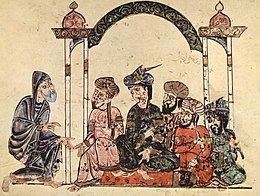
Back تعريب (سياسة) Arabic Arabización AST Арабизация Bulgarian আরবিকরণ Bengali/Bangla Arabització Catalan عەرەباندن CKB Arabisierung German Αραβοκρατία Greek Arabigo Esperanto Arabización Spanish

| Part of a series on |
| Arabic culture |
|---|
 |
Arabization or Arabicization (Arabic: تعريب, romanized: taʻrīb) is a sociological process of cultural change in which a non-Arab society becomes Arab, meaning it either directly adopts or becomes strongly influenced by the Arabic language, culture, literature, art, music, and ethnic identity as well as other socio-cultural factors. It is a specific form of cultural assimilation that often includes a language shift.[1] The term applies not only to cultures, but also to individuals, as they acclimate to Arab culture and become "Arabized". Arabization took place after the Muslim conquest of the Middle East and North Africa, as well as during the more recent Arab nationalist policies toward non-Arab minorities in modern Arab states, such as Algeria,[2] Iraq,[3] Syria,[4] Egypt,[5] Bahrain,[6] and Sudan.[2]
After the rise of Islam in the Hejaz and subsequent Muslims conquests, Arab culture and language spread outside the Arabian Peninsula through trade and intermarriages between members of the non-Arab local population and the peninsular Arabs. The Arabic language began to serve as a lingua franca in these areas and various dialects were formed. This process was accelerated by the migration of various Arab tribes outside of Arabia, such as the Arab migrations to the Maghreb.
The influence of Arabic has been profound in many other countries whose cultures have been influenced by Islam. Arabic was a major source of vocabulary for various languages. This process reached its zenith between the 10th and 14th centuries, widely considered to be the high point of Arab culture, during the Islamic Golden Age.
- ^ Marium Abboud Houraney (December 2021). "The Crossroads of Identity: Linguistic Shift and the Politics of Identity in Southwest Asia and North Africa" (PDF).
- ^ a b Reynolds, Dwight F. (2 April 2015). The Cambridge Companion to Modern Arab Culture. Cambridge University Press. ISBN 978-0-521-89807-2.
- ^ Iraq, Claims in Conflict: Reversing Ethnic Cleansing in Northern Iraq. [1]
- ^ Alexander K. McKeever (2021). "Between Kurdistan and Damascus: Kurdish Nationalism and Arab State Formation in Syria".
- ^ Hassan Mneimneh (June 2017). "Arabs, Kurds, and Amazigh: The Quest for Nationalist Fulfillment, Old and New".
- ^ Banafsheh Keynoush (2016). Saudi Arabia and Iran: Friends Or Foes?. Springer. p. 96. ISBN 9781137589392.
© MMXXIII Rich X Search. We shall prevail. All rights reserved. Rich X Search